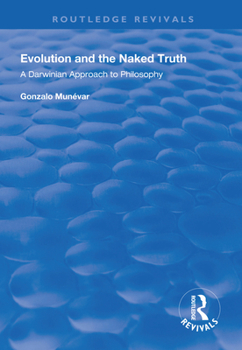Evolution and the Naked Truth: Darwinian Approach to Philosophy
Published in 1998, the main aim of this book is to use a naturalistic, evolutionary approach to solve some of the most important problems in philosophy. The first two problems come from the philosophy of science: the problem of rationality of science and the problem of truth in science. In presenting the first problem, the author argues that the views of Kuhn and Feyerabend do create a very serious challenge to traditional epistemology, however, if the assumption of individual rationality is abandoned in favour of the author's social concept of rationality, a committed naturalism can account for science as a rational activity. In tackling the second problem of truth, the author shows that a committed evolutionary philosophy does not support realism but leads instead to a thorough evolutionary relativism of scientific knowledge. It is nevertheless possible to use this evolutionary relativism to construct a theory of relative truth. The issue of whether science discovers truth has also been tied to absolutism, that a well formulated theory of relative truth is likely to bring about a profound transformation of the way we think about the field. The author explores the notion of relative truth in the philosophy of science, ethics and aesthetics.





